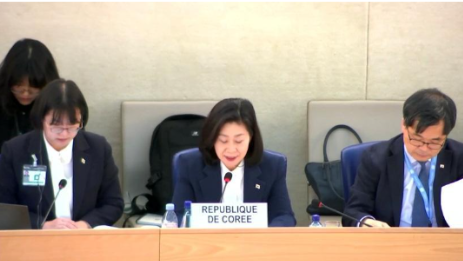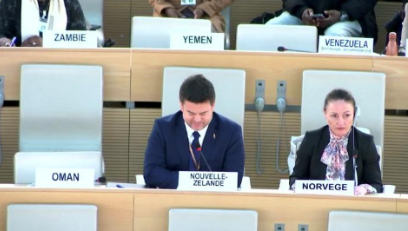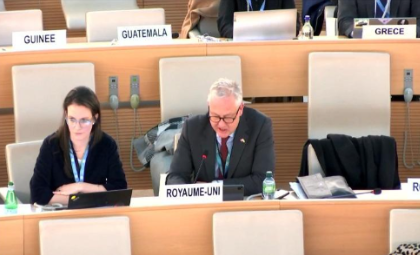High levels of concern raised over the rights of women, and the Criminal Military Act.
The 42nd Session of the Universal Periodic Review
Review of Republic of Korea - Fourth Cycle
26 January 2023

By Khoa Doan / GICJ
Executive Summary
On the 26th of January 2023, the Universal Periodic Review (UPR) Working Group of the UN Human Rights Council conducted its fourth periodic review of the human rights situation in the Republic of Korea. South Korea submitted its country report on the 10th of October 2022. Taking into account the recommendations made by Special Rapporteurs and treaty body experts, the Human Rights Council and civil society organisations delivered reports with a compilation of different human rights issues in Indonesia.
As part of the interactive dialogue, participating delegations raised several issues, which the Republic of Korea tried to address and clarify in its responses. Among the topics discussed were the right to life, liberty and security of person, and freedom from torture, administration of justice, including impunity, and the rule of law, the right to privacy, the right to work and to just and favourable conditions of work, the right to health as well as ratification of treaties, children's rights, women's rights and LGBTI persons’ rights, and human rights education. Despite the country's efforts in fulfilling the obligations in accordance with the core international human rights treaties and complying with the human rights mechanisms, the Military Criminal Act still poses potential human rights violations against LGBTI persons.
Geneva International Centre for Justice (GICJ) urges the Republic of Korea to officially end the death penalty. Moreover, we call on the Republic of Korea to reform the legislative measures to put an end to all violence and discrimination against all marginalised groups. Moreover, we call on South Korea to guarantee the rights of migrant workers and freedom of thought, conscience and religion in society.
Background
 The UPR is a UN mechanism established in 2006 (Res. 60/251) to examine the progress made by countries in compliance with their obligations under international law. UN member states are examined during each cycle, the current one being the fourth cycle. The Republic of Korea was first reviewed in May 2008, in October 2012, and finally in November 2017.
The UPR is a UN mechanism established in 2006 (Res. 60/251) to examine the progress made by countries in compliance with their obligations under international law. UN member states are examined during each cycle, the current one being the fourth cycle. The Republic of Korea was first reviewed in May 2008, in October 2012, and finally in November 2017.
The Republic of Korea submitted its country report for the fourth cycle of the UPR in October 2022, in accordance with paragraph 5 of the annex to Human Rights Council resolution 16/21. They acknowledged that they received 218 recommendations during the third cycle, of which 85 were accepted. These recommendations are related to business and human rights, improvement of human rights in the military, the right to education, civil and political rights, economic, social, and cultural rights, protection of women and children’s rights, persons with disabilities, and migrants and refugees.
Taking into account the recommendations made by Special Rapporteurs and treaty body experts, the Human Rights Council and civil society organisations delivered reports with a compilation of different human rights issues in South Korea. Concerns were raised about the country’s cooperation with international human rights mechanisms and bodies, the national human rights framework, as well as the principles of equality and non-discrimination. Further, other delegations expressed concern overthe right to life, liberty and security of person, freedom from torture, the administration of justice, including impunity, and the rule of law, political and civil rights, the right to social security, the right to an adequate standard of living, the right to health and education, and the rights of specific persons or groups, including women, children, LGBTI persons, and migrants, refugees and asylum seekers.
Interactive dialogue
Ms. Lee Noh Kong, Vice-Minister of Justice, began by first thanking the UN and the troika for their efforts to contribute to the present report. She emphasised that the Republic of Korea had made efforts to fulfil its obligations in accordance with the core international human rights treaties and to comply with the human rights mechanisms. The Government held a dialogue during the country visits of the Special Rapporteurs as well as continued its cooperation with the OHCHR Seoul Office, despite the Covid-19 pandemic. Furthermore, the country has made efforts to implement development cooperation based on a human rights-based approach. The third Strategic Plan for International Development Cooperation (2021-2025) stipulates that gender and human rights should be considered in formulating Official Development Assistance policies and designing projects. The country takes human rights into account over the course of planning, implementing, and evaluating grant development cooperation projects by implementing human rights impact assessment.
Concerning human rights in the military, the Republic of Korea appointed an officer to lead the investigatory committee responsible for investigation, corrective measures and policy recommendations in 2022. After the death of Private Yoon, the country has been operating a comprehensive system to prevent suicide through the stages of identification, management and separation and by providing mental counselling and treatment for soldiers with difficulties during service. In addition, the Ministry of National Defense and the military established organisations for the prevention of and response to sexual violence to deal with relevant cases. The country is preparing for the enactment of the Framework Act on Human Rights Policy to prepare the legal basis for the establishment, implementation, and promotion system of the National Action Plan (NAP).
Regarding women’s rights and empowerment, the Republic of Korea established and implemented the second Gender Equality Basic Plan (2018-2022) to eliminate discrimination against women and to promote gender equality. The Framework Act on Prevention of Violence against Women was enacted and implemented in December 2019. It clarifies the responsibility of the state and local governments in the prevention of violence against women as well as victim protection and support. The First Basic Plan of Policies to Prevent Violence against Women (2020-2024) was prepared and implemented. The country enacted and enforced the Act on the Punishment of Stalking Crimes to prevent crimes by defining and punishing stalking as a crime since October 2021. In order to respond to digital sex crimes, the Ministry of Gender Equality and Family (MOGEF) opened the Digital Sex Crime Victim Support Centre in April 2018. The Equal Employment Opportunity and Work-Family Balance Assistance Act stipulates the principle of equal pay for equal work and has a provision to impose punishment upon gender discrimination in wages.
Moreover, South Korea amended the Child Welfare Act in April 2020 to make public officials responsible for child abuse in all local governments, receive child abuse reports, conduct on-site investigations, and seek emergency protection. The country introduced a child allowance in September 2018 so that all children aged seven or under can receive a child allowance regardless of their parents’ wealth or income.
Finally, Ms. Lee Noh Kong noted that the Republic of Korea had actively participated in discussions on human rights within the HRC and the Third Committee of the General Assembly. The country adopted the resolution on New and Emerging Digital Technologies and Human Rights and Local Government and Human Rights to expand the basis of human rights. The country made efforts to protect and promote the human rights of vulnerable groups during the Covid-19 pandemic, especially migrants’ rights to health.
Right to Life, Liberty, Security of Person, and Freedom from Torture
Death sentences continued to be employed, although no executions had been carried out since 1997. Italy emphasised that the Republic of Korea must aim to abolish the death penalty de jure and to commute all death sentences in terms of imprisonment. New Zealand and the UK called on the Republic of Korea to stop all death sentences without delay and adopt legislative measures to fully abolish the death penalty. These two countries recommended that South Korea ratify the Second Optional Protocol to the International Covenant on Civil and Political Rights. The Republic of Korea has not executed the death penalty for 25 years. The country voted for the 75th UNGA resolution on the use of Moratorium on Death Penalty in November 2020 and the 48th HRC Resolution on the Question of the Death Penalty in October 2021 for the first time. However, the abolition of the death penalty requires careful review with a comprehensive consideration of public opinion because it relates to the foundation of the punitive authority of the state.
emphasised that the Republic of Korea must aim to abolish the death penalty de jure and to commute all death sentences in terms of imprisonment. New Zealand and the UK called on the Republic of Korea to stop all death sentences without delay and adopt legislative measures to fully abolish the death penalty. These two countries recommended that South Korea ratify the Second Optional Protocol to the International Covenant on Civil and Political Rights. The Republic of Korea has not executed the death penalty for 25 years. The country voted for the 75th UNGA resolution on the use of Moratorium on Death Penalty in November 2020 and the 48th HRC Resolution on the Question of the Death Penalty in October 2021 for the first time. However, the abolition of the death penalty requires careful review with a comprehensive consideration of public opinion because it relates to the foundation of the punitive authority of the state.
Prohibition of All Forms of Slavery, including Trafficking in Persons
 The legal definition of human trafficking in the Republic of Korea was narrow. Malawi called on the Republic of Korea to reform its legislative measures to provide for adequate punishment for the crime of human trafficking. Vietnam is concerned about the ineffectiveness of Investigative agencies and immigration officials who have not been able to effectively identify victims of human trafficking. The UK recommended the Republic of Korea to improve the identification and referral of children who were victims, especially among vulnerable populations and ensure that children who had been sold or trafficked were not treated as offenders or subjected to criminal sanctions and deportations. The Republic of Korea emphasised that the Act on the Prevention of Human Trafficking and the Protection of Victims had been enacted and will be enforced from January 2023. The Act defines the concepts concerning human trafficking and the group of crimes in line with international norms, while stipulating the establishment of a government-wide response system; strengthening the identification, protection of, and support for victims; and promoting the general public’s awareness-raising.
The legal definition of human trafficking in the Republic of Korea was narrow. Malawi called on the Republic of Korea to reform its legislative measures to provide for adequate punishment for the crime of human trafficking. Vietnam is concerned about the ineffectiveness of Investigative agencies and immigration officials who have not been able to effectively identify victims of human trafficking. The UK recommended the Republic of Korea to improve the identification and referral of children who were victims, especially among vulnerable populations and ensure that children who had been sold or trafficked were not treated as offenders or subjected to criminal sanctions and deportations. The Republic of Korea emphasised that the Act on the Prevention of Human Trafficking and the Protection of Victims had been enacted and will be enforced from January 2023. The Act defines the concepts concerning human trafficking and the group of crimes in line with international norms, while stipulating the establishment of a government-wide response system; strengthening the identification, protection of, and support for victims; and promoting the general public’s awareness-raising.
Rights of Specific Persons or Groups
Besides several Acts above for empowering and protecting women’s rights, the Republic of Korea established and managed a plan to enhance female representation in the public sector (2018-2022). The country achieved 10% of executives, 24.4% of directors, and 22.5% of executives in public institutions as of 2021. The ratio of female executives in listed corporations increased from 4.0% in 2019 to 5.2% in 2021. Laos expressed concern that women and girls continued to experience structural and systemic inequalities and discrimination. Nepal and Japan emphasised that women experienced gender-based discrimination in political domains. Russia encouraged the country to create stricter measures against domestic violence and to hold abusers accountable through the justice system.
In April 2022, the Supreme Court made an acquittal in the case of an indictment for violation of Article 92-6 of the Military Criminal Act, which punishes sexual acts between soldiers of the same sex. The USA. recommended the Republic of Korea to ensure that same-sex couples are not discriminated against in the realisation of their economic and social rights and benefits, legalising same-sex marriage. New Zealand, among other delegations, urged the Republic of Korea to repeal article 92-6 of the Military Criminal Act, and all members of the armed forces must be trained in diversity.
Position of Geneva International Centre for Justice
Geneva International Centre for Justice (GICJ) calls on the Republic of Korea to take any necessary steps to improve the human rights situation within the country. We urge the country to improve legislation to protect vulnerable groups, especially by prohibiting any form of violence against women, children, elderly persons, persons with disabilities, migrant workers, and ensure equal treatment of all persons. To conclude, we urge the Republic of Korea to harmonise its legislation with international law and standards, and to ratify all UN treaties, particularly the ICRMW, ICPPED, ICCPR-OP2, OP-CAT, OP-ICESCR, OP-CRC-IC, and OP-CRPD.
Republic of Korea, Right to Life, Liberty, Security of Person, and Freedom from Torture, Prohibition of All Forms of Slavery, including Trafficking in Persons, Rights of Specific Persons or Groups, Death Penalty, Human Rights in Military, Treaty Ratifications, Geneva, geneva4justice, GICJ, Geneva International Centre For Justice




